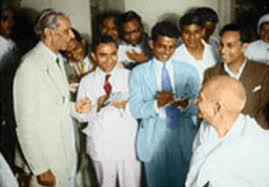The Quaid said:
"We stand by our declarations that members of every community will be treated as citizens of Pakistan with equal rights and privileges and obligations and that the minorities will be safeguarded and protected".
He added: “But you must have a little patience and give us time to make the effort to give effect to those declarations. I assure you of our goodwill and solicitude for the welfare of the Scheduled Castes in particular, as you have been downtrodden for countries, deserve more help than any other community. I have always advocated your cause and I shall continue to do so.”
In regard to their proposal that two Scheduled Caste Ministers should be included in the East Bengal Ministry, the Quaid-i-Azam said: “It is not that we are against including the Scheduled Castes in the Ministry, but the present position of the Schedule Castes in the Assembly is that you have only five members who follow you out of 19. We are after all working on the lines of democracy and if we were to take one of those five, it would neither be good for you nor for the East Bengal Ministry, because it will at once be said, as far as we are considered, that he was only a creature of the Bengal Prime Minister who had picked him up, whereas he did not enjoy the confidence of the overwhelming majority of the Scheduled Caste members of the Assembly. This has been one of the difficulties in our way for which we ourselves are most anxious for a solution.
Source: South Asian Studies: bi-annual Research Journal, Vol.17, No. 1 (Quaid-i-Azam Number) January 2002, PP. 89-90. Also cited in The Pakistan Times, March 24, 1948.
Showing posts with label East Bengal. Show all posts
Showing posts with label East Bengal. Show all posts
Audio Gallery
"I have lived as plain Mr. Jinnah and I hope to die as plain Mr. Jinnah. I am very much averse to any title or honours and I will be more than happy if there was no prefix to my name."
-: Audio clips of Speeches of
The Quaid-e-Azam Mohammad Ali Jinnah :-
The Quaid-e-Azam Mohammad Ali Jinnah :-
Partition of Bengal
The partition of Bengal shook India in 1905. Lord Curzon, one of the most powerful British rulers gave affect to the partition. With a population of over 80 million, it was difficult to administer the province so a line was drawn between the Hindu dominated West Bengal and the Muslim dominated East Bengal. Dacca became the capital of the new Muslim majority province comprising Eastern Bengal and Assam. West Bengal with Hindu majority was administered from Calcutta. The birth of the “Eastern Bengal and Assam” province was considered as a blessing and a moment of relief for the Muslims whereas it was an eyesore for the Hindus.
The Hindu community was aghast at the creation of the Muslim majority province and even a movement was launched against the partition. Calcutta’s Bengali Hindu elite protested vehemently against this partition. Large rallies and protests on the streets were carried out frequently all over the country and the British goods were also boycotted.
The impassioned anti-government speeches brought the common man in the streets. Though Jinnah was not very vocal about the issue of the partition of Bengal but its effects were to alter his life and career tremendously in the future. The partition of Bengal gave the Muslims of Bengal adequate representation in the power structure and awakened political consciousness among them which led to the formation of the Muslim League in 1906.
The Hindu community was aghast at the creation of the Muslim majority province and even a movement was launched against the partition. Calcutta’s Bengali Hindu elite protested vehemently against this partition. Large rallies and protests on the streets were carried out frequently all over the country and the British goods were also boycotted.
The impassioned anti-government speeches brought the common man in the streets. Though Jinnah was not very vocal about the issue of the partition of Bengal but its effects were to alter his life and career tremendously in the future. The partition of Bengal gave the Muslims of Bengal adequate representation in the power structure and awakened political consciousness among them which led to the formation of the Muslim League in 1906.
Subscribe to:
Posts (Atom)
Gandhi and Jinnah - a study in contrasts
An extract from the book that riled India's Bharatiya Janata Party and led to the expulsion of its author Jaswant Singh, one of the foun...

-
Speech on the Inauguration of the Pakistan Constituent Assembly on 14th August, 1947 Your Excellency, I thank His Majesty the King on behalf...
-
Reply to the Civic Address presented by the Quetta Municipality on I5th June, 1948. I thank you for your address of welcome and for the ki...




